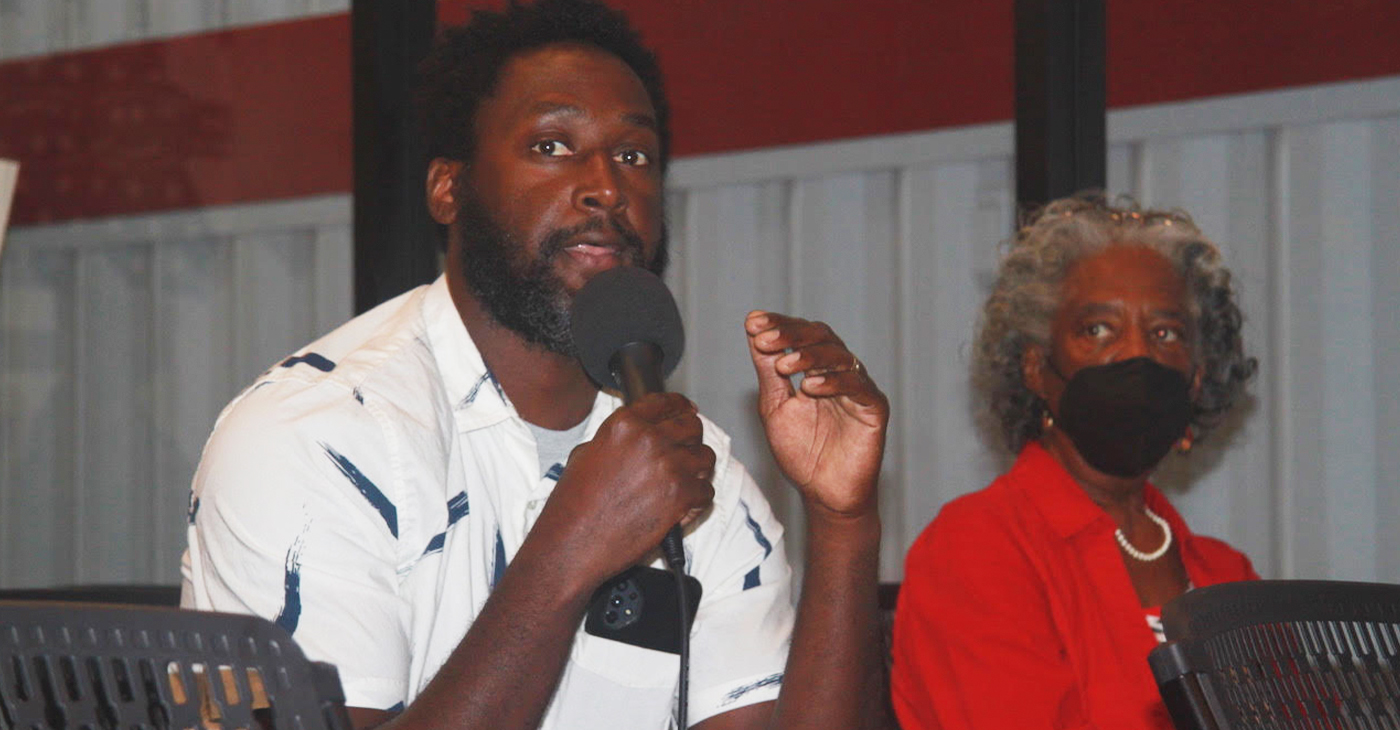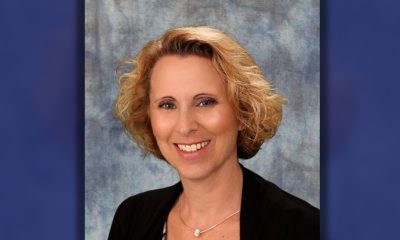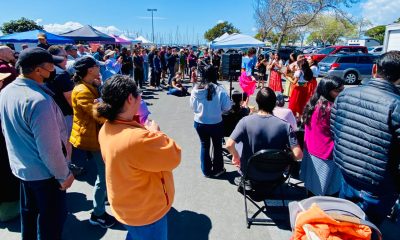Activism
Statewide “Listening Sessions” Allow Reparations Task Force to hear Black Californians Stories
The community listening sessions are being conducted across the state by the Reparations Task Force’s seven “anchor organizations.” The seven, Afrikan Black Coalition, Black Equity Collective, Black Equity Initiative, California Black Power Network, Coalition for a Just and Equitable California, Othering and Belonging Institute (University of California Berkeley) and Repaired Nations began conducting community gatherings in March.

Antonio Ray Harvey | California Black Media
A series of community Listening Sessions are being held statewide to help the nine members of the California Task Force to Study and Develop Reparations Proposals for African Americans better understand how laws and policies that contribute to perpetuating the effects of slavery have negatively impacted Black Californians.
The most recent three gatherings authorized by the Task Force took place last month.
An online community session was conducted featuring panelists Friday Jones, Los Angeles Reparations Commission Vice Chair; Jan Williams, Downtown Crenshaw Board member; and University of California at Berkeley professor Dr. Jovan Scott Lewis.
“What (Reparations) must do is bring about this sense of recognition,” said Lewis, who is a member of the California Reparations Task Force.
“One of the things that the [Task Force] has accomplished so far over the past year is to bring about a sense of recognition for the Black American community in California and the country overall,” Lewis told the online audience.
The virtual webinar and Community Listening session was hosted by the Coalition for a Just and Equitable California (CJEC), the American Redress Coalition of California (ARCC), and Community Health Councils (CHC).
CJEC is a state-wide coalition of organizations, associations, and community members that support reparations for Black Californians who are descendants of enslaved Black American men and women. CHC is a Los Angeles-based nonprofit committed to practices advancing justice, equity, diversity, and inclusion to achieve sustainable policy and systemic change.
A sanctioned in-person community listening session was held in the city of Vallejo. It was hosted by CJEC with the support of the state’s Department of Justice (DOJ) and the Black Women Organized for Political Action (BWOPA).
The event was held at Black-owned LaDells Shoes in downtown Vallejo. Personal testimony of adversity and success rooted in the Black experience in and around Vallejo were shared during this session. Struggles with employment, decent housing, racism in public schools, homelessness, police brutality, and the challenges of maintaining a business were covered.
“In May we had our first community conversation about reparations [in Oakland, Calif.] and it was an overall history of reparations in the United States,” said Dr. Kerby Lynch, who recently received a doctorate in geography from the University of California Berkeley. “This session is about what reparations look like for Vallejo. We are here to listen to one another’s stories and record these testimonies.”
Vallejo is one of the cities in the state with a modest population of Black people who are fighting for recognition during the reparations proceeding. It does have an abundance of Black history to be shared.
Home of the former Mare Island Naval Shipyard, Vallejo is 32 miles north of San Francisco. The 2020 United States Census says the East Bay Area city had a population of 22,416 Black people (18.48%) out of a total of 121,275. Statewide Blacks are 5.4% of the population.
The third listening session hosted by CJEC was held in Sacramento. Task Force member and Bay Area attorney Don T. Tamaki participated virtually in the session that was held in Sacramento’s Oak Park neighborhood.
At the Sacramento listening session, the community testified about how to build small businesses, Black people’s “Great Migration” from the deep south to the west coast, how the Freedman’s Bureau model can be used to determine reparations, and Black pioneer’s presence during the Gold Rush.
The community listening sessions are being conducted across the state by the Reparations Task Force’s seven “anchor organizations.”
The seven, Afrikan Black Coalition, Black Equity Collective, Black Equity Initiative, California Black Power Network, Coalition for a Just and Equitable California, Othering and Belonging Institute (University of California Berkeley) and Repaired Nations began conducting community gatherings in March.
The listening sessions are designed to ensure certain communities around the state have the opportunity to provide their thoughts and concerns about the work the task force is doing.
On June 1, 2022, the Task Force issued a 483-page interim report to the California legislature. The report surveys the ongoing and compounding harms experienced by African Americans as a result of slavery and its lingering effects on American society today.
“It’s a sweeping indictment,” Tamaki said of the report during the Sacramento community listening session. “It connects the harms of the past and follows the consequences that we face today. There have to be legislative remedies.”
The interim report also includes a set of preliminary recommendations for policies that the California Legislature could adopt to remedy those harms. A final report will be issued before July 1, 2023.
The Task Force in-person meetings will reconvene in Los Angeles at the Paradise Baptist Church on Friday, Sept. 23, at 9:00 a.m. and Saturday, Sept. 24, 2022, at 9:00 a.m. The church is located at 5100 S. Broadway.
For updates and additional information visit Reparations Task Force Meetings.
Activism
Oakland Post: Week of April 24 – 30, 2024
The printed Weekly Edition of the Oakland Post: Week of April 24 – 30, 2024

To enlarge your view of this issue, use the slider, magnifying glass icon or full page icon in the lower right corner of the browser window. ![]()
Activism
Oakland Post: Week of April 17 – 23, 2024
The printed Weekly Edition of the Oakland Post: Week of April 17 – 23, 2024

To enlarge your view of this issue, use the slider, magnifying glass icon or full page icon in the lower right corner of the browser window. ![]()
Activism
Oakland Schools Honor Fred Korematsu Day of Civil Liberties
Every Jan. 30, OUSD commemorates the legacy of Fred Korematsu, an Oakland native, a Castlemont High School graduate, and a national symbol of resistance, resilience, and justice. His defiant stand against racial injustice and his unwavering commitment to civil rights continue to inspire the local community and the nation. Tuesday was “Fred Korematsu Day of Civil Liberties and the Constitution” in the state of California and a growing number of states across the country.

By Post Staff
Every Jan. 30, OUSD commemorates the legacy of Fred Korematsu, an Oakland native, a Castlemont High School graduate, and a national symbol of resistance, resilience, and justice.
His defiant stand against racial injustice and his unwavering commitment to civil rights continue to inspire the local community and the nation. Tuesday was “Fred Korematsu Day of Civil Liberties and the Constitution” in the state of California and a growing number of states across the country.
One OUSD school is named in his honor: Fred T. Korematsu Discovery Academy (KDA) elementary in East Oakland.
Several years ago, founding KDA Principal Charles Wilson, in a video interview with anti-hate organization “Not In Our Town,” said, “We chose the name Fred Korematsu because we really felt like the attributes that he showed in his work are things that the children need to learn … that common people can stand up and make differences in a large number of people’s lives.”
Fred Korematsu was born in Oakland on Jan. 30, 1919. His parents ran a floral nursery business, and his upbringing in Oakland shaped his worldview. His belief in the importance of standing up for your rights and the rights of others, regardless of race or background, was the foundation for his activism against racial prejudice and for the rights of Japanese Americans during World War II.
At the start of the war, Korematsu was turned away from enlisting in the National Guard and the Coast Guard because of his race. He trained as a welder, working at the docks in Oakland, but was fired after the bombing of Pearl Harbor in 1941. Fear and prejudice led to federal Executive Order 9066, which forced more than 120,000 Japanese Americans out of their homes and neighborhoods and into remote internment camps.
The 23-year-old Korematsu resisted the order. He underwent cosmetic surgery and assumed a false identity, choosing freedom over unjust imprisonment. His later arrest and conviction sparked a legal battle that would challenge the foundation of civil liberties in America.
Korematsu’s fight culminated in the Supreme Court’s initial ruling against him in 1944. He spent years in a Utah internment camp with his family, followed by time living in Salt Lake City where he was dogged by racism.
In 1976, President Gerald Ford overturned Executive Order 9066. Seven years later, the 9th Circuit Court of Appeals in San Francisco vacated Korematsu’s conviction. He said in court, “I would like to see the government admit that they were wrong and do something about it so this will never happen again to any American citizen of any race, creed, or color.”
Korematsu’s dedication and determination established him as a national icon of civil rights and social justice. He advocated for justice with Rosa Parks. In 1998, President Bill Clinton gave him the Presidential Medal of Freedom saying, “In the long history of our country’s constant search for justice, some names of ordinary citizens stand for millions of souls … To that distinguished list, today we add the name of Fred Korematsu.”
After Sept. 11, 2001, Korematsu spoke out against hatred and discrimination, saying what happened to Japanese Americans should not happen to people of Middle Eastern descent.
Korematsu’s roots in Oakland and his education in OUSD are a source of great pride for the city, according to the school district. His most famous quote, which is on the Korematsu elementary school mural, is as relevant now as ever, “If you have the feeling that something is wrong, don’t be afraid to speak up.”
-

 Activism4 weeks ago
Activism4 weeks agoOakland Post: Week of March 27 – April 2, 2024
-

 #NNPA BlackPress4 weeks ago
#NNPA BlackPress4 weeks agoBeloved Actor and Activist Louis Cameron Gossett Jr. Dies at 87
-

 Community1 week ago
Community1 week agoFinancial Assistance Bill for Descendants of Enslaved Persons to Help Them Purchase, Own, or Maintain a Home
-

 Activism3 weeks ago
Activism3 weeks agoOakland Post: Week of April 3 – 6, 2024
-

 Business1 week ago
Business1 week agoV.P. Kamala Harris: Americans With Criminal Records Will Soon Be Eligible for SBA Loans
-

 Activism2 weeks ago
Activism2 weeks agoOakland Post: Week of April 10 – 16, 2024
-

 Community1 week ago
Community1 week agoAG Bonta Says Oakland School Leaders Should Comply with State Laws to Avoid ‘Disparate Harm’ When Closing or Merging Schools
-

 Community6 days ago
Community6 days agoOakland WNBA Player to be Inducted Into Hall of Fame



















































